Collaboratory update August 2023 | Colombia
All the latest from our Colombia Collaboratory
25 August 2023
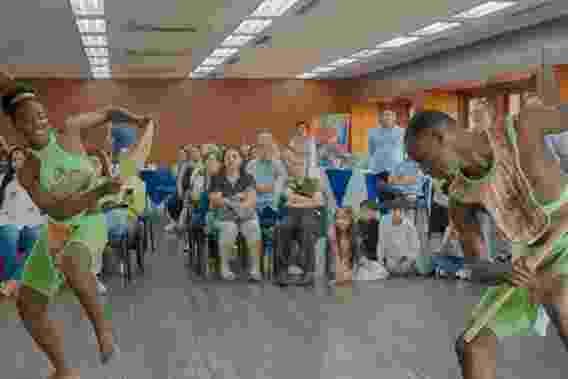
Snippets from the values exhibition

Snippets from the values exhibition
Whilst crucial to all life on earth, water holds more values than sustenance alone. One of the Hub’s key research themes explores the multiple, multifaceted values of water and how they are intrinsic to understanding water systems. This Spring our Colombia Collaboratory held an exciting exhibition in Cali, celebrating water values and Earth Day. The aim of the event was to highlight the pluralistic values of water, through the artistic expression of the inhabitants of the Upper Cauca River Basin. The event was enriched by a wonderful variety of artistic displays by the participants and guests, including music, theatre, dance, paintings, embroidery, comedy, drawings, photography, and more. Artists participated in three categories: visual arts, performing arts, and literary arts. Two experts judged each category, presenting 1st, 2nd, and 3rd place awards. Keep an eye out for a showcase of the works featured, coming soon.
Earlier this year, in collaboration with the SHARE project, our Colombia team distributed 1,000 water filters to communities throughout rural areas in Popayán, Totoró, Cajibio, and Silvia in the Department of Cauca. The team has recently made a number of follow up visits to monitor water quality and the efficacy of the filters installed in homes in Popayán and Silvia. Other aims of the activity were also to identify risk conditions for the transmission of waterborne diseases, and to generate education and training strategies for the correct handling of water quality filters. The team will continue to carry out regular monitoring visits and work closely with the communities to ensure the filters provide what they need.
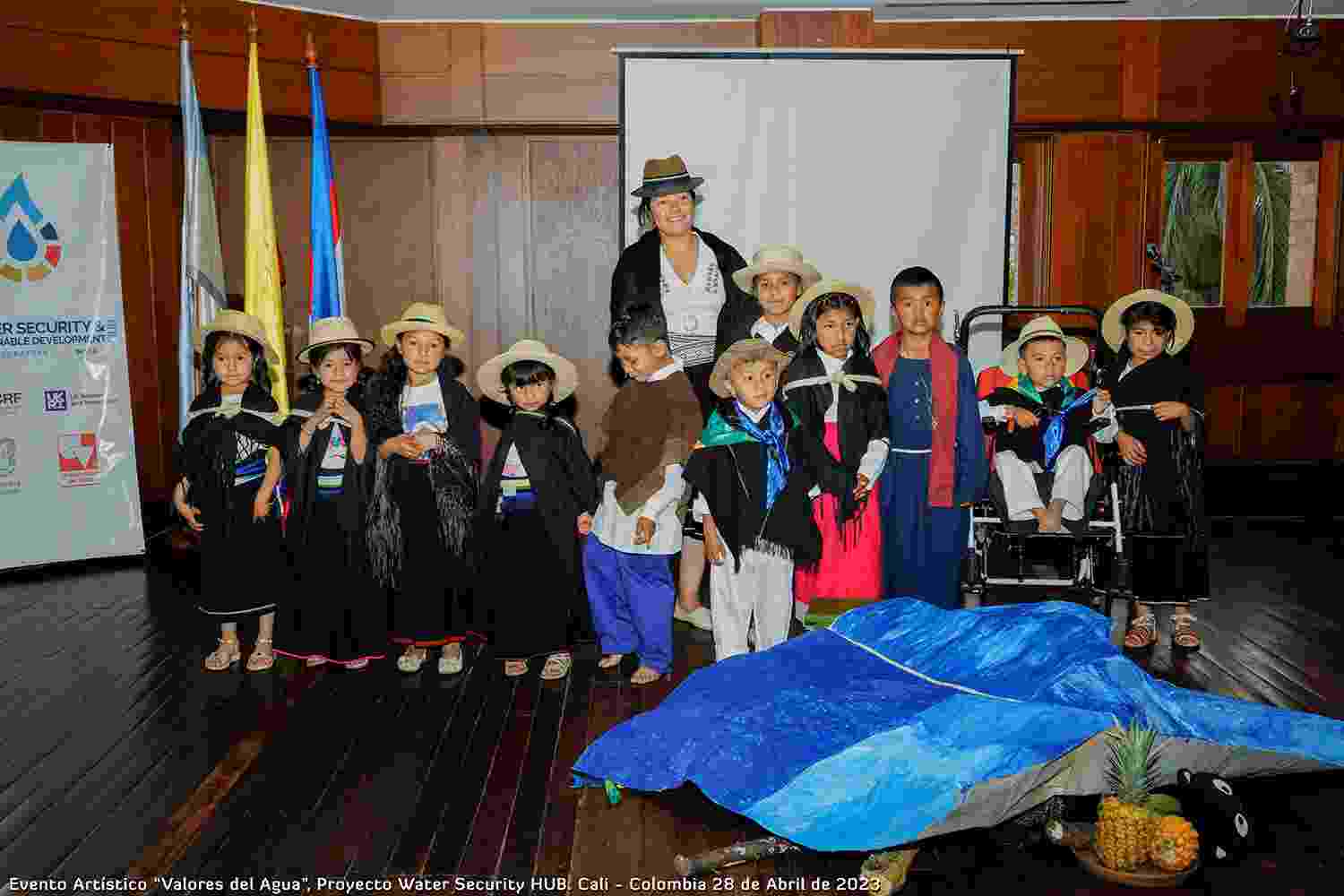
Snippets from the values exhibition
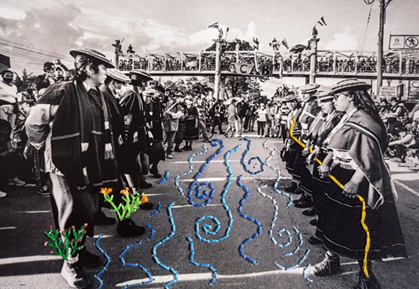
Snippets from the values exhibition
In partnership with the SHARE project, the Colombia team held the VI Water Forum of Southwest Colombia at the Universidad del Cauca. This year’s theme was ‘Co-construction of water and food security strategies’. Professor Jaime Amezaga, the Hub’s Deputy Director, delivered the keynote speech on systems thinking and the international water security network. Luisa Gómez, coordinator of the Páramos y Bosques project of the Río Piedras Foundation and USAID, spoke about the socio-ecological impacts of the project. The event had a community focus with presentations by Zoraida Golondrino from the campesino organisation ASOCAMPO, and Taita Salomón Cuchillo from the Misak Mama Manuela Educational Institution. An expert panel featuring community environmental promoters of the SHARE project also took place, including Alexandra Victoria, Esmeralda Solarte, Xiomara León, and the governor of the Ampiule indigenous community, Pedro Pablo Pillimué.
As well as working directly with communities, Colombian colleagues have developed strong partnerships with community-led organisations. AQUACOL, a local organisation focused on water and sanitation services among rural communities, recently held its General Assembly of Associates. The space was used to; identify the problems of community water management organisations managing water for human consumption; conduct an analysis of draft Law 271/2022; and to socialise the progress made in the processes of water management with allied organisations. Our team took part in the assembly and knowledge exchange activities, participating with three presentations covering research progress and advances in Nuestra Agua (‘Our Water’), the water information system we have developed in collaboration with communities.
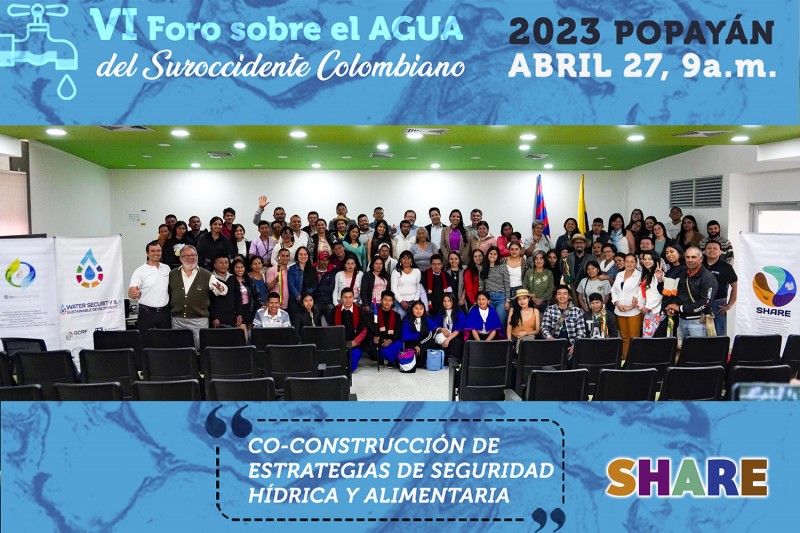
VI Water Forum of Southwest Colombia
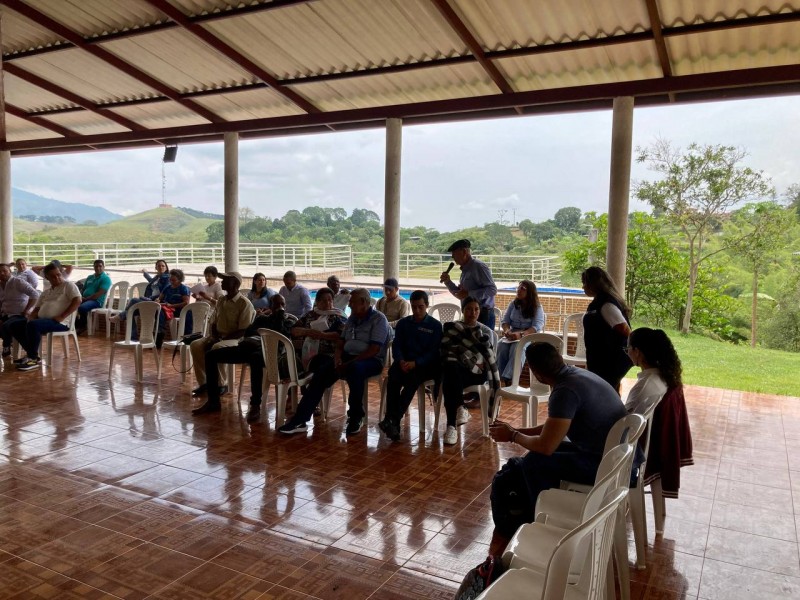
AQUACOL General Assembly of Associates
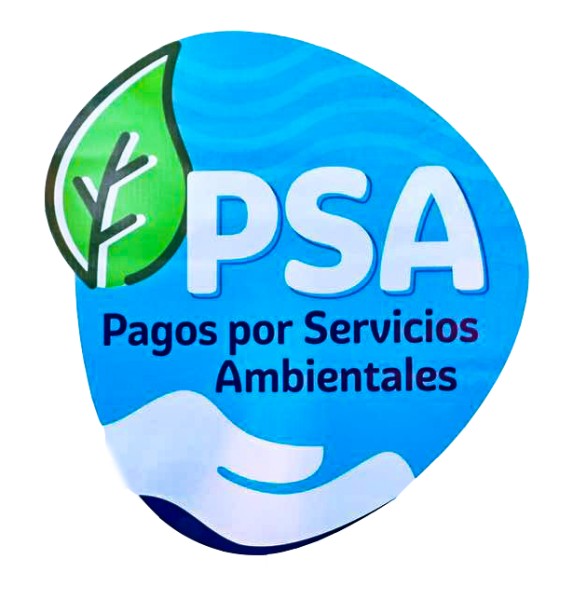
Jamundí Payment for Ecosystem Services Programme
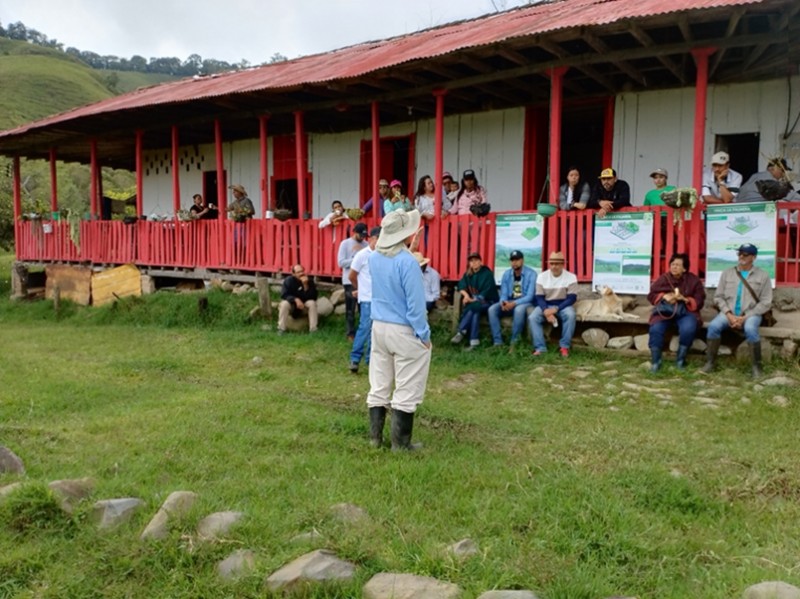
Touring Finca La Palmera
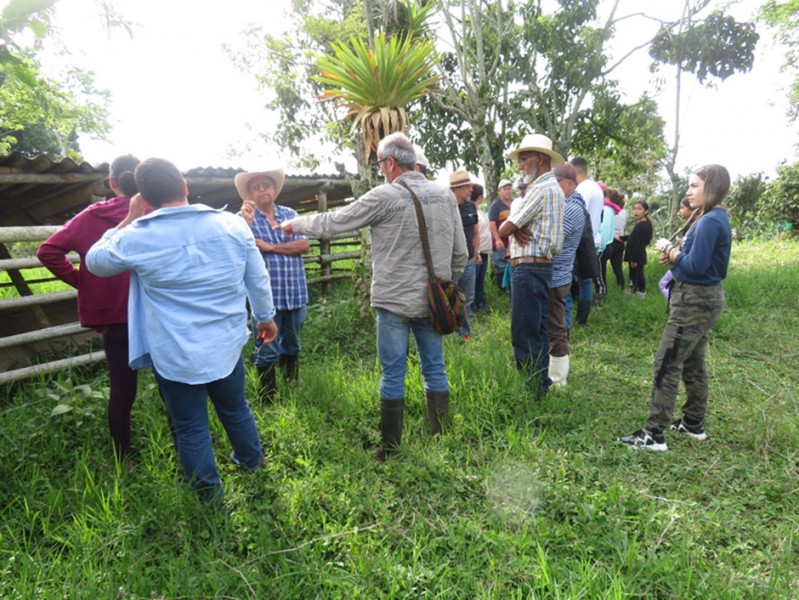
Visiting the biodigester, San José Farm
Exciting progress has been made in the Hub’s work in the municipality of Jamundí, as the public policy on the Payment for Ecosystem Services (PES) programme has been approved, guaranteeing its implementation over the next 12 years. The PES programme was formed using a social-ecological systems approach (SES) as the analytical framework, something not used widely in the sector. Developed with crucial collaboration and input from rural aqueduct representatives, social leaders, community organisations, and professionals from the Jamundí mayor's office, the programme has enabled the strengthening of governance in rural organisations in the municipality, in which 84 farms have been strengthened and 849 hectares have been conserved. This programme has the potential to protect and conserve ecosystems in an equitable manner, encouraging investment in common goods (e.g. the agro-ecological community market) and sustainable economic activities. Read more about the Hub’s work on PES in this paper and this piece.
Additionally, following the signing of an agreement between Universidad del Valle and the Centre for Research on Sustainable Agricultural Production Systems (CIPAV), the subproject focused on socio-ecological transitions in the Guerrero micro-watershed of Jamundí is progressing. Hub members recently took part in knowledge exchange activities, including a tour of the San José and Finca La Palmera farms, located in Ulloa, Valle del Cauca, and Santa Rosa de Cabal, Risaralda respectively. 24 producers from Peñas Negras, Bocas del Palo, San Antonio, Irlanda, San Vicente and Clavellinas (areas located in the municipality of Jamundí) attended the tour, learning about silvopastoral systems, water ram and water storage, wastewater treatment using a biodigester, and the female entrepreneurs running the coffee shop, Amarte Café. The tour attendees have shown great interest and motivation in applying what they’ve learned and sharing the knowledge they’ve acquired.
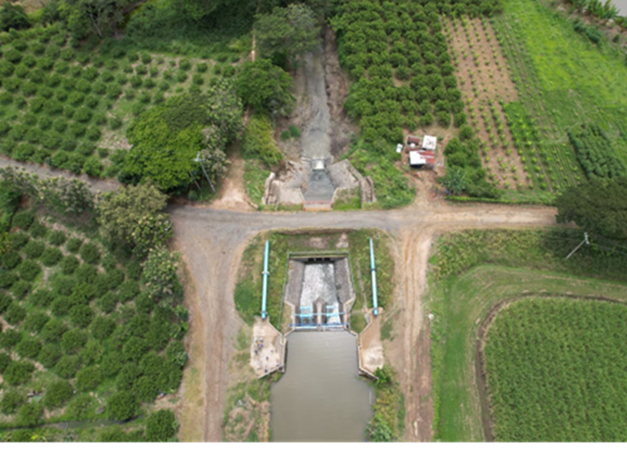

Potential location for deployment of NBS for diffuse pollution control, RUT District (UCRB)
The Hub is supporting the implementation of a strategic action plan to tackle pollution reduction. The Collaborative Platform for the Recovery of the Upper Cauca River Basin (URCB), is made up of both public and private entities with an overall objective of achieving a shared vision of water resource management across the watershed, representing and involving all actors fairly. Centred on Nature-Based Solutions (NBS), the project aims to generate knowledge and data to inform better decision making and management of pollution in the Cauca River, including micropollutants, and point and diffuse pollution derived from the consumption of pharmaceuticals and personal care products, and the use of agrochemicals. The project activities will strengthen laboratory capacity to monitor micropollutants, use modelling to identify the most critical areas for managing this type of contamination, and evaluate NBS on a pilot scale for the bioremediation of micropollutants. (To find out more, please get in touch with Andrés Toro).
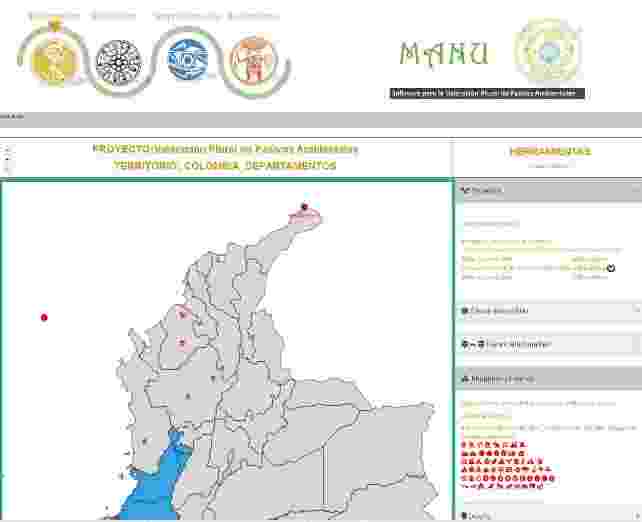

Screenshot of the MANU software
Building on their development of the free software MANU, designed to help communities form their claims within the processes of environmental justice, the Colombia Collaboratory has delivered a free course on how to use the innovative programme. MANU is a free application for the plural valuation of socio-environmental liabilities. It integrates libraries and other open software applications into a single platform, providing powerful algorithms that can be used to perform plural valuations in more than 20 different valuation methods and value domains, such as ecological, sociocultural, and economic. Led by Esteban Correa, the training course comprises 10 hours of virtual classes and 20 hours of study, and over 180 people from Argentina, Peru, Mexico, Bolivia, and Colombia enrolled on the course. So far, over 60 participants have completed the course, becoming pioneers of the MANU software in Latin America. The course also provided an important opportunity to detect errors and for students to offer suggestions for improvements, which will feed into the continuous improvement the team are committed to. (For more information about the MANU software, please get in touch with Esteban).
Finally, building capacity amongst our global water networks is key to meaningful action towards SDG6 and achieving water security. David Chaquea-Romero (Universidad del Valle), attended this year’s Intellectual Party hosted by Lancaster University, an event where PhD students from around the world can come together to discuss their work in a friendly and encouraging environment, and learn from each other’s knowledge and experience. David is the first Latin American PhD student to take part in this annual event.
Read the latest newsletter from the Colombia Collaboratory here.



